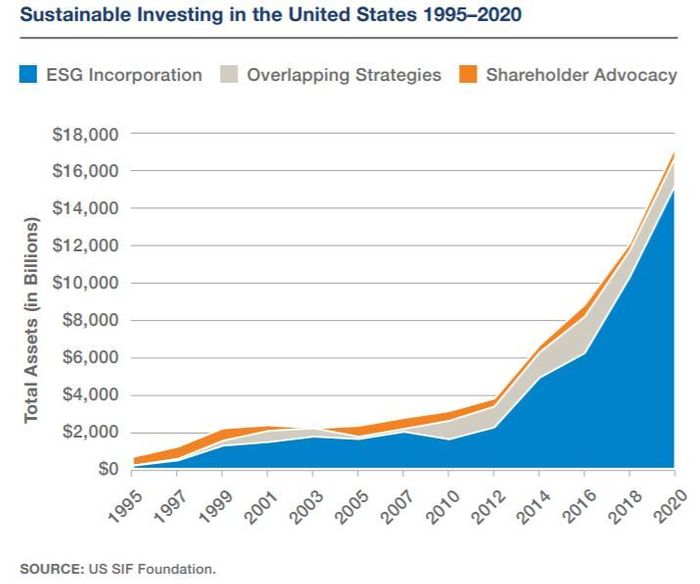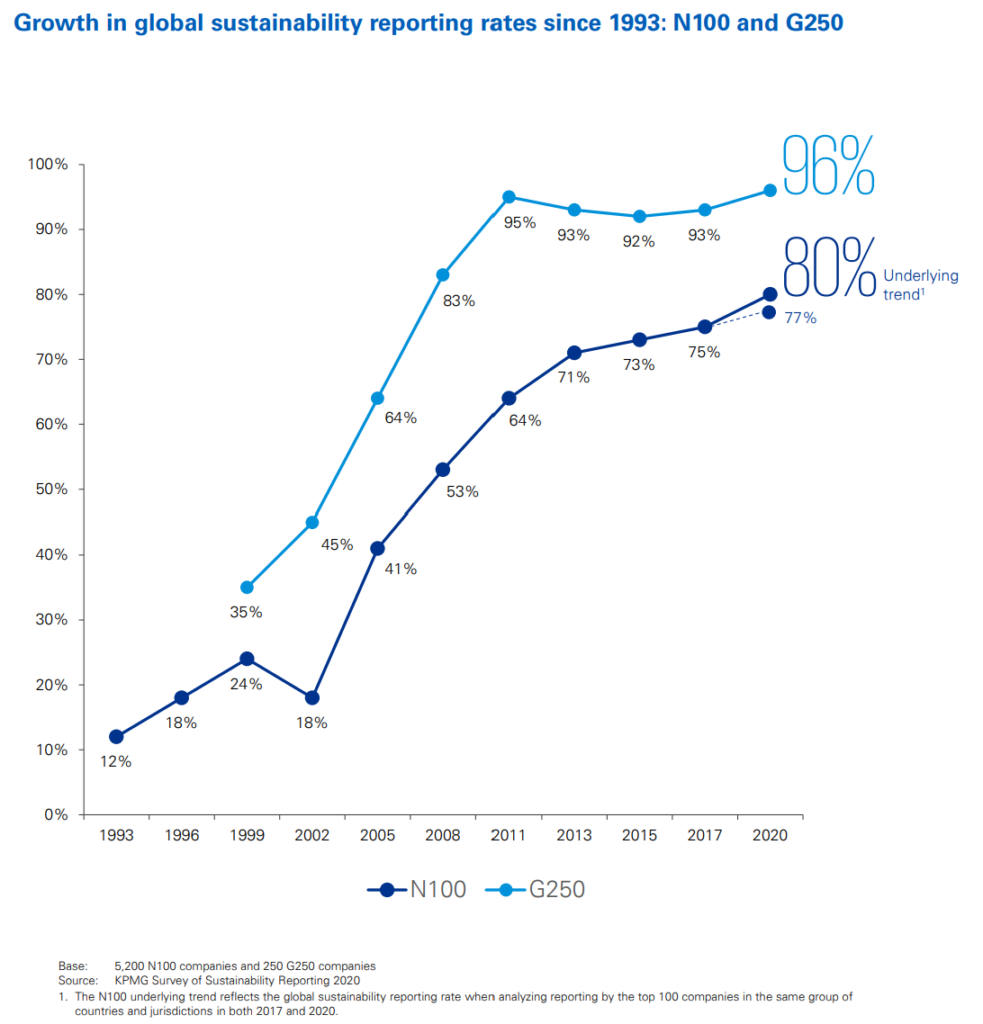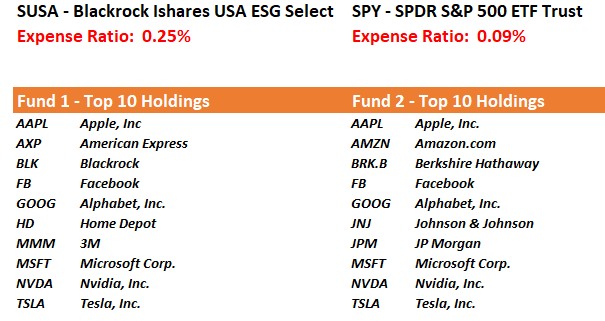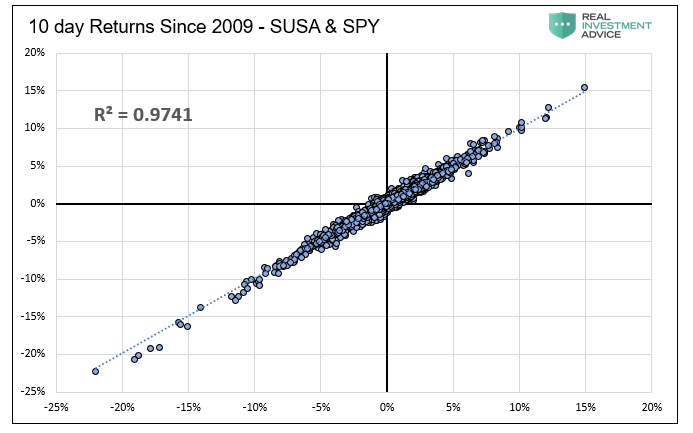Wall Street “wins again” by taking more money from savers as the Department Of Labor considers allowing the ESG scam to infiltrate retirement plans.
“The U.S. Department of Labor today announced a proposed rule that would remove barriers to plan fiduciaries’ ability to consider climate change and other environmental, social and governance factors when they select investments and exercise shareholder rights.
The proposed rule, “Prudence and Loyalty in Selecting Plan Investments and Exercising Shareholder Rights,” follows Executive Order 14030, signed by President Biden on May 20, 2021. The order directs the federal government to implement policies to help safeguard the financial security of America’s families, businesses and workers from climate-related financial risk that may threaten the life savings and pensions of U.S. workers and families.”
While the Department of Labor is following an executive order, are they doing the best thing for retirement plan savers?
Since the financial crisis, great strides to bolster the fiduciary standards of retirement plans to protect workers got made. For example, rules requiring plan sponsors to ensure offerings had track records from reputable firms, low fees, tenured managers, etc., all benefited savers.
In their publication, even the Department Of Labor noted the importance of low fees to savers outcomes.
“While contributions to your account and the earnings on your investments will increase your retirement income, fees and expenses paid by your plan may substantially reduce the growth in your account which will reduce your retirement income.”
The problem is that ESG investing does nothing to improve investor outcomes, but rather, due to significantly higher fees, it likely makes them worse.
What Is ESG Investing?
ESG refers to the Environmental, Social, and Governance risk theoretically embedded in a business. However, while ESG investing is about taking these risks into account in investment decisions, these are all the things NOT on a company’s balance sheet or earnings statements. Such is the inherent problem.
However, as is also the case, with the recent surge in liberal policies, woke activism, and demand for social justice, Wall Street is more than willing to sell products to fill a need. Not surprisingly, with plenty of media coverage, ESG investing has become an enormous business.
Following the financial crisis, ESG funds had roughly a ZERO market share of total assets under management. Today, ESG-labeled funds in the United States exceed $16 trillion. According to the US SIF Foundation’s 2020 biennial “Report on U.S. Sustainable and Impact Investing Trends,“ sustainable investing assets now total $17.1 trillion, a 42% increase over 2018.
Think about that for a moment. ESG investing now encompasses 33% of total U.S. assets under management.

All of a sudden, everyone is now” “green!”
The question is whether investors are getting what they are paying for?
ESG – A Label With No Meaning
In the late’90s, Wall Street had a significant movement to limit investing in “sin” stocks such as gambling, tobacco, pornography, etc. Just as it was then, investors initially jumped on board, but when returns failed to match the S&P index, that “fad” died away.
The same occurs today as investors who want to be “woke” demand products that make them feel good to purchase. However, there are many problems with ESG outside the labeling. There are currently no universal rules to analyze ESG risks. Nor are there any clear frameworks to police ESG-labeled investment products.
As Eco-Business recently noted:
“For example, deforestation is a major driver of climate change. You would think it’s being used as a filter to ensure companies in ESG-labelled funds are not turning a blind eye to deforestation, but you would be wrong. Carbon Tracker, an industry ‘think tank,’ found that 78% of mutual fund providers offered ESG investments. However, none specifically excluded deforestation risk. Not a single one actively priced climate risk either.”
As Seth Levine previously wrote:
“Almost all large companies satisfy sustainability reporting requirements now. Source
"Naturally, companies are gaming the ESG system. There’s simply too much to gain. However, the essence of ESG, improving the world, is something that every business does. Of course, every company is ESG-compliant. Given the intense market competition, every entity must lower its cost of capital if it can. ESG trophies for all!“

In other words, ESG is a label fund managers are sticking on funds to attract capital, yet there are no guidelines on what investors are investing in.
Investing In A Publicly Traded Company Makes No Difference
Here is another problem with ESG investing—it makes NO difference to the environment.
Think about how mutual fund investing works for a moment.
An investor buys shares of a mutual fund. The fund manager, in turn, purchases shares of the underlying investments from the open market. The underlying companies receive no capital from the transaction, nor are they aware a transaction occurred.
In this scenario, how were carbon emissions reduced? Were trees planted? Did companies take a different direction with their management teams? Of course, not.
So who benefitted?
If you think investment managers are doing it for the “good of the environment,” think again.
“Investment managers and banks are taking advantage of our collective willingness to help fight climate change because the ESG space is, to put it mildly, a zoo.
"Epic greenwashing is everywhere: Out of 253 funds that switched to an ESG focus in 2020 in the US, 87 per cent of them rebranded by adding words such as ‘sustainable’ or “ESG” or ‘green’ or ‘climate’ to their names.
"None changed their stock or bond holdings at that point.” – Eco-Business
Why would they change their name and not their holdings? Good question.
ESG Is A Money Scam
In our previous discussion, we dug into the main driver behind the business.
“With ESG now the rage, the ‘demand’ drives product development. However, there is also an understanding of why large asset managers have embraced the strategy so readily – higher fees.
Let’s review our example, comparing the BlackRock iShares MSCI USA ESG Select (NYSE:SUSA) fund to the SPDR® S&P 500 Index ETF (NYSE:SPY). Notice the similarity of the top-10 holdings and the difference in fees.

Yes, you too can own an ESG fund that is almost three times as expensive as the S&P 500 index, all for the sake of “feeling good about yourself.”
According to The Wall Street Journal:
“Citing ETF data from FactSet, it found the ESG funds’ ‘average fee was 0.2% at the end of last year, while standard ETFs that invest in U.S. large-cap stocks had a 0.14% fee on average. A firm managing $1 billion in a typical ESG fund, for example, would garner $2 million in annual fees versus managing the standard ETF’s $1.4 million.”
Look again at the table above. Furthermore, there are virtually no significant differences in the ESG ETF except BlackRock (NYSE:BLK) put their company stock in the lineup. But, of course, there is “no self-serving purpose” except that as billions pour into the ETF, it boosts BlackRock’s stock price.
As Michael Edesess recently addressed in “Stop The ESG Nonsense:”
“There are three serious problems with ESG investing:”
• it won’t really accomplish its claimed objectives;
• it will give the pursuit of those objectives a bad name by undermining the seriousness of their pursuit;
• and most importantly, it creates an industry of well-compensated but Mickey Mouse jobs paid for by increased fees for investment management, drawing people away from much more important work in which they should be engaged."
Paying More, Getting Less
With this understanding, you can see where the Department of Labor is erring in its policy recommendations. While ESG investing sounds noble, in reality, investors pay substantially more for performance that is no better than existing index funds. As shown, the correlation between BlackRock’s USA ESG fund and the S&P 500 Index is almost perfect.

Chart courtesy of Michael Lebowitz, CFA
“These funds lately haven’t beat indices that are simply created to make you money and only do so when they pack themselves with high-flying tech names. Sounds good on paper — until you drill down.
"For starters, such investing methods are highly political and veer far to the left. Companies often get good grades for supporting lefty causes such as Black Lives Matter. Oil companies like Exxon (NYSE:XOM) will get higher marks for building wind farms that produce energy inefficiently.
"But here’s where Larry Fink and BlackRock still come out ahead: They have sensed that with all the media hype of ESG investing as the next frontier, they can also make a lot of money creating a new type of fund dedicated specifically to ESG — and then charge more for it.” – NY Post
In short, while Wall Street pushes out products to make “you” feel as if you are socially responsible, such is not the case.
When you buy an ESG fund, you are NOT contributing to making the environment better. Instead, you are substantially increasing the incomes and profits of companies like BlackRock, which benefits Larry Fink personally. But, of course, Larry Fink, with his personal jet, numerous mansions, and individual lifestyle, has a carbon footprint more significant than most small neighborhoods.
So, what are you doing for the environment?
Wall Street Wins Again
The Department of Labor is not doing you, or the environment, any favors in pushing the ESG narrative into your retirement plan. The evidence undermines every premise of their proposed rule change:
- ESG will NOT safeguard the financial security of America’s families, businesses and workers.
- Investing in mutual funds or ETFs makes no difference in climate-related financial risk.
- Substantially increasing the underlying fees in retirement plans is the biggest threat to the life savings and pensions of U.S. workers and families.
What is true is that where money flows, greed always follows.
“If governance is a hard quality to measure, rating a company’s environmental and social impact – the other two-thirds of hot investment style ESG – is even more challenging. But where the money flows, accusations of fraud follow and in 2020 there has been no shortage of examples of businesses claiming high ESG credentials with little merit.” – Investors’ Chronicle
If you want to be a socially responsible investor, there is only ONE way to achieve that goal. You must invest directly in private startup companies that are tackling climate change effectively. Once a company is public, all you do is trade dollars for another investor’s shares. As noted, that transaction has ZERO impact on the environment or the company.
Unfortunately, the Department of Labor is about to implement a rule change in retirement plans that hurts retirement savers. It does nothing to affect climate change but greatly benefits the one group of people who need it the least.
Wall Street wins again.
